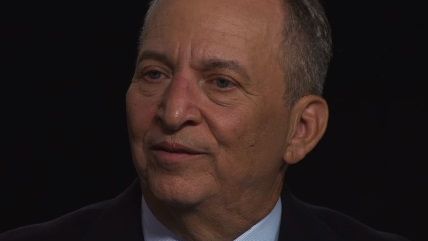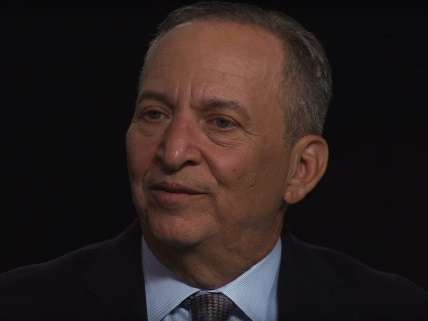Former Harvard President Larry Summers Warns of 'Creeping Totalitarianism' on College Campuses
A victim of political correctness denounces students' lack of perspective.


"To regard it as one of life's premiere moral injustices to have to eat dinner underneath a portrait of Woodrow Wilson is to lose perspective on what is happening in the world." That was former Harvard University President Larry Summers' take on the increasingly petty concerns of college students, which he shared during a revealing conversation with The Weekly Standard's Bill Kristol.
The full interview is worth watching, because Summers very closely articulates my own views on the subject of modern campus discourse. Summers opines that not all political correctness is bad: some of it is the positive effect of very real social progress. It's a good thing, for instance, that it's no longer acceptable to yell insulting remarks at gays.
The problem, as Summers puts it, is that students are increasingly averse to the idea of the university as a place where dissent is not only tolerated, but actively encouraged, and all kinds of beliefs are put to the test'"not just because those beliefs are mistaken, but because skepticism and scrutiny are intellectual tools that must be cultivated.
Summers says:
It seems to me that there is a sort of creeping totalitarianism in terms of what kinds of ideas are acceptable and debatable on college campuses, and I think that is hugely unfortunate. I think the answer to bad speech is different speech. The answer to bad speech is not shutting down speech, whether it's climate deniers, and I yield to no one in my degree of confidence that the scientific evidence points to overwhelming evidence that there is a serious global climate change problem, but atmospheric scientists who disagree with that conclusion should be able to have their say. I was proud to write a brief as president of Harvard in support of affirmative action, and I think that's the right position and I hope the Supreme Court will uphold it, but those who feel differently should be able to have their say. And the idea that for example as took place in recent years, a serious suggestion is put forward that the law of rape not be covered at Harvard Law School because it would be a painful experience for some law students, is one that it seems to me administrators should be denouncing, rather than sympathizing with. The idea that somehow microaggressions in the form of a racist statement contained in a novel, should be treated in parallel with violence, or actual sexual assault, seems to me to be crazy.
The notion that law professors might stop teaching rape law because the subject is uncomfortable for certain students sounds preposterous, but it's not at all made up. Jeannie Suk, one of the Harvard law professors concerned about The Hunting Ground's misrepresentation of Brandon Winston, has written on the subject here.
Summers, it should be remembered, resigned as president of Harvard in 2006 after hyper-offended students and professors ran him off campus for the crime of merely discussing some social science research about innate intelligence among men and women. That episode seems especially relevant to what's happening on campus today. Harvard psychologist Steven Pinker defended Summers on free speech grounds in an interview with The Harvard Crimson:
CRIMSON: Were President Summers' remarks within the pale of legitimate academic discourse?
PINKER: Good grief, shouldn't everything be within the pale of legitimate academic discourse, as long as it is presented with some degree of rigor? That's the difference between a university and a madrassa.
CRIMSON: Would it be normal to hear a similar set of hypotheses presented and considered at a conference of psychologists?
PINKER: Some psychologists are still offended by such hypotheses, but yes, they could certainly be considered at most major conferences in scientific psychology.
CRIMSON: Finally, did you personally find President Summers' remarks (or what you've heard/read of them) to be offensive?
PINKER: Look, the truth cannot be offensive. Perhaps the hypothesis is wrong, but how would we ever find out whether it is wrong if it is "offensive" even to consider it? People who storm out of a meeting at the mention of a hypothesis, or declare it taboo or offensive without providing arguments or evidence, don't get the concept of a university or free inquiry.
It seems legitimate to worry that these kinds of people have a great deal of power on the modern university campus.


Show Comments (132)